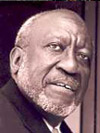| Home | Blog | Ask This | Showcase | Commentary | Comments | About Us | Contributors | Contact Us |

Why aren’t there more blacks performing or leading in classical music?ASK THIS | July 202, 2005It’s nice that Marin Alsop, a woman, got to be conductor in Baltimore. But for John Britton it raises a different set of questions. By John Britton jbritton@mmc.edu Q. Are symphony orchestra participants most often chosen through "blind" auditions? Q. Who ultimately decides who is good enough to play in an orchestra and who is not? Q. How is it possible that so few African Americans perform with, say, The National Symphony Orchestra, which is based in a metropolitan area that is more than 30 percent black? Q. Is there a credible explanation, outside of tradition and old habits, for the lack of African American members of American symphony orchestras? Q. Are African American conductors even on the radar screen when major symphony orchestras are recruiting for music directors? Notwithstanding covetous claims by some black American musicians that jazz is, at root, an African American art form, that genre is, nevertheless, populated by many Caucasian instrumentalists, composers, arrangers, conductors, and fans. Indeed, anecdotal evidence suggests that jazz is received with greater enthusiasm by audiences in European capitals than is the case in the On the other hand, performance of classical music in major symphony orchestras generally remains off-limits to African American musicians and, especially, to black conductors. The world of classical music currently is facing unaccustomed public scrutiny after members of the Baltimore Symphony Orchestra openly rebelled as the symphony’s board went through the process of appointing a woman, Marin Alsop, as its 12th music director. But scant mention, if any, has been made of the racial homogeneity of symphony orchestras nationwide. The It is commonly agreed that music is a universal language that communicates powerfully where words often fail. Why, then, in the year 2005 do major American symphony orchestras persist in performing with no African American conductors and, worse yet, only a handful of African American instrumentalist? Shouldn't symphony orchestras - many of whose boards solicit public donations and whose performances are often rendered in public facilities - be closely questioned about their penchant for maintaining and sustaining what appears to be one of the most unreconstructed, restrictive personnel policies of any industry in I won't even mention the world of opera, whose omission of African American talent is quite blatant and even more indefensible, given the available talent. Sources for Comments Esa-Pekka Salonen, Music Director, Christoph Eschenbach, Music Director, The Leonard Slatkin, Music Director, The National Symphony Orchestra; 202/416-8000 Ann Dibbrell Jordan, Chairman, Board of Directors, The National Symphony Orchestra; 202/416-8000 Daniel Barenboim, Music Director, Lorin Maazel, Music Director, Wynton Marsalis, Artistic Director, Jazz at Dr. Thomas Korth, Chairman, Department of Music, American Symphony Orchestra League:
|



